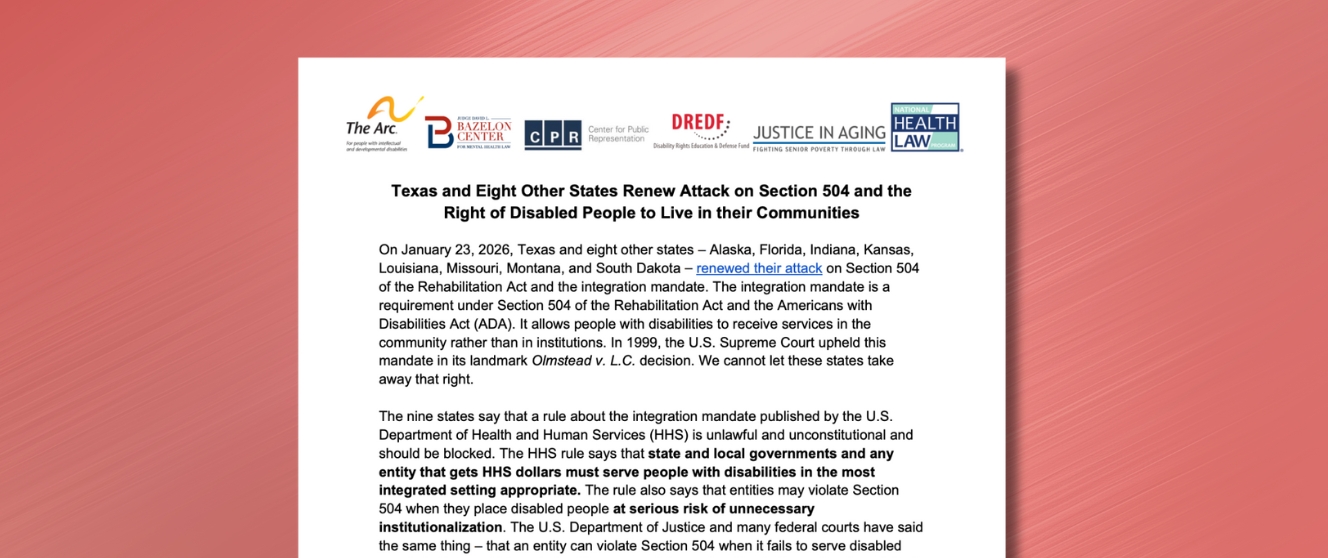
October 10, 2012
DREDF Secures Historic Settlement in National Association of the Deaf, et al. v. Netflix, Ensuring 100% Closed Captions in Netflix’s On–Demand Streaming Content Within Two Years
Today’s precedent-setting Consent Decree will increase access for people who are deaf and hard of hearing to movies and television streamed on the Internet, one of the fastest growing entertainment venues in the country. The case is already notable for establishing that the ADA applies to on line only businesses, a critical issue as society moves from Main Street to the Internet.
“DREDF hopes that this is the beginning of opening the Internet for our country’s 48 million deaf and hard of hearing individuals in streamed entertainment, education, government benefits, and more,” said Arlene Mayerson, DREDF’s Directing Attorney. “We’re so pleased that Netflix worked jointly with plaintiffs to devise a reasonable and workable way to achieve 100% captioning. The Decree is a model for the streaming entertainment industry.”
DREDF is honored to have worked with Lewis, Feinberg, Lee, Renaker & Jackson P.C., and the Boston, MA law firm Sugarman, Rogers, Barshak & Cohen, P.C. on this case.
- Consent Decree: National Association of the Deaf, et al. v. Netflix, Case No. 3:11-cv-30168
- Press Release, October 10, 2012
June 19, 2012
DREDF victory in NAD v. Netflix: Court rules that the ADA applies to web-only businesses!
In a major victory for the National Association of the Deaf (NAD), the nation’s premier civil rights organization for deaf and hard of hearing individuals, the District Court of Massachusetts held that the ADA applies to website-only businesses. In National Association of the Deaf, et al. v. Netflix, Judge Ponsor denied Netflix’s motion for judgment on the pleadings and is allowing this disability civil rights case to move forward. The underlying lawsuit alleges that Netflix violates the ADA by failing to provide closed captioning on most of its “Watch Instantly” programming streamed on the Internet, thereby denying equal access to the deaf and hard of hearing community. Read the Order below.
May 15, 2012
DREDF and Lewis Feinberg filed an Opposition to Netflix’s Motion for Judgment on the Pleadings asserting that Netflix is a place of public accommodation under Title III of the ADA, that Netflix sufficiently controls its Watch Instantly content to be held liable under the ADA, and that the 21st Century Communications and Video Accessibility Act does not conflict with or supersede the ADA. The Department of Justice also filed a Statement of Interest in Opposition to Netflix’s Motion for Judgment on the Pleadings.
November 10, 2011
Update on National Association of the Deaf (NAD) v. Netflix (11.9.11)
Our first oral argument in NAD v. Netflix took place this week (November 8) in front of Judge Michael Ponsor in the U.S. District Court for the District of Massachusetts in Springfield, MA. We filed a complaint against Netflix in June 2011 for failing to provide adequate closed captioning on its Watch Instantly website and Netflix moved to dismiss the case. Judge Ponsor granted a stay in the case until February 6, 2012 (pending the Federal Communication Commission’s issuance of regulations for the 21st Century Communications and Video Accessibility Act) but denied Netflix’s motion to dismiss. Read the Judge’s order on Netflix’s motion to dismiss.
June 16, 2011
National Association of the Deaf Files Disability Civil Rights Lawsuit against Netflix
Deaf and Hard of Hearing Plaintiffs Charge that Netflix Violates the Americans with Disabilities Act by Not Providing Equal Access to its “Watch Instantly” Streaming Content. An estimated 36 million Americans are deaf or hard of hearing according to the National Institutes of Health. The deaf and hard of hearing community has repeatedly protested Netflix’s refusal to provide closed captioning on “Watch Instantly.”
On June 16, 2011, the National Association of the Deaf (NAD) the nation’s premier civil rights organization of deaf and hard of hearing individuals, announced the filing of a major federal lawsuit against Netflix today in U.S. District Court, District of Massachusetts, Western Division in Springfield, MA.
The lawsuit charges the entertainment giant with violating the Americans with Disabilities Act (ADA) by refusing to provide closed captioning for “Watch Instantly” movies and television streamed on the Internet. The New York Times has described Netflix as the “only major player in the online-only video subscription business.” Netflix has over 60% of the streamed video services market share. Plaintiffs are asking the court to declare that Netflix’s behavior constitutes a violation of Title III of the ADA, and to require that Netflix provide closed captions on all of its streaming content.
Quotes:
“We have tried for years to persuade Netflix to do the right thing and provide equal access to all content across all platforms. They chose not to serve our community on an equal basis; we must have equal access to the biggest provider of streamed entertainment. As Netflix itself acknowledges, streamed video is the future and we must not be left out.” — NAD President Bobbie Beth Scoggins.
“Netflix has no excuse for not providing captions so that deaf and hard of hearing customers have access to the same movies and TV shows as everyone else. Netflix admits that there is no technological issue. For people who are deaf and hard of hearing, captions are like ramps for people who use wheelchairs.” – Arlene Mayerson, Directing Attorney of the Disability Rights Education and Defense Fund.
Comments from Consumers:
The NAD has received many complaints about Netflix directly from deaf and hard of hearing individuals from all over the country. Here are some of the comments the NAD has received:
“I am frustrated with Netflix for not having captioning. I have a hearing grandson who wants to watch these streamed programs, but it means my deaf daughter and deaf husband are discriminated against,… not allowed to view the same program, given the lack of captions… I hope this is rectified quickly.”
“I’m a Netflix subscriber and am VERY disappointed in the selection of closed captioned movies I can download instantly. …I feel like I have a
very small selection as opposed to what they really have in their movie
library. I’d like to see more movies closed captioned.”
“I support the enforcement of closed captioned films provided by Netflix. … It is a multimillion dollars corporation and they should be held to the same standards along with the broadcast television companies. The lack of the closed captions films provided by Netflix is a ‘slap in the deaf communities’ face.'”
“I am unable to watch Netflix movies, unlike my hearing husband and children who can watch any movies. I cannot watch movies with my children and cannot know what they are listening to or the contents of the movies. …”
“… I’m very upset that Netflix has not provided captions for their ‘watch instantly movies’ that stream online. I would support any legal actions against Netflix.”
These comments are only a few of the many inquiries the NAD received across the country from consumers who have contacted the NAD expressing their frustrations that Netflix does not provide access to its “Watch Instantly” programming. For these individuals, this Netflix feature becomes a “Watch Later When Netflix Decides to Captions” programming.
Info about Parties:
National Association of the Deaf (NAD)
The National Association of the Deaf (NAD) is the nation’s premier civil rights organization of, by and for deaf and hard of hearing individuals in the United States of America. NAD represents the estimated 36 million Americans who are deaf or hard of hearing and is based in Washington, D.C.
Western Massachusetts Association of the Deaf and Hearing Impaired (WMAD)
WMAD is an advocacy membership organization for individuals who are deaf and hearing impaired in western Massachusetts.
Disability Rights Education and Defense Fund (DREDF)
Founded in 1979, by people with disabilities and parents of children with disabilities, the Disability Rights Education and Defense Fund (DREDF) is a national law and policy center, based in Berkeley, CA, dedicated to protecting and advancing the civil rights of people with disabilities.
Lewis, Feinberg, Lee, Renaker & Jackson P.C.
Lewis, Feinberg, Lee, Renaker & Jackson P.C. is a national law firm based in Oakland, CA, that represents plaintiffs in ERISA employee benefit and pension litigation, Civil Rights litigation, and Wage and Hour Overtime litigation.
Sugarman, Rogers, Barshak & Cohen, P.C.
SRBC is a Boston-based civil litigation firm with 26 lawyers and more than 80 years of success in managing complex cases for local, regional and national clients.
If you think you have been discriminated against by Netflix, you may call us toll-free at 800-348-4232.

